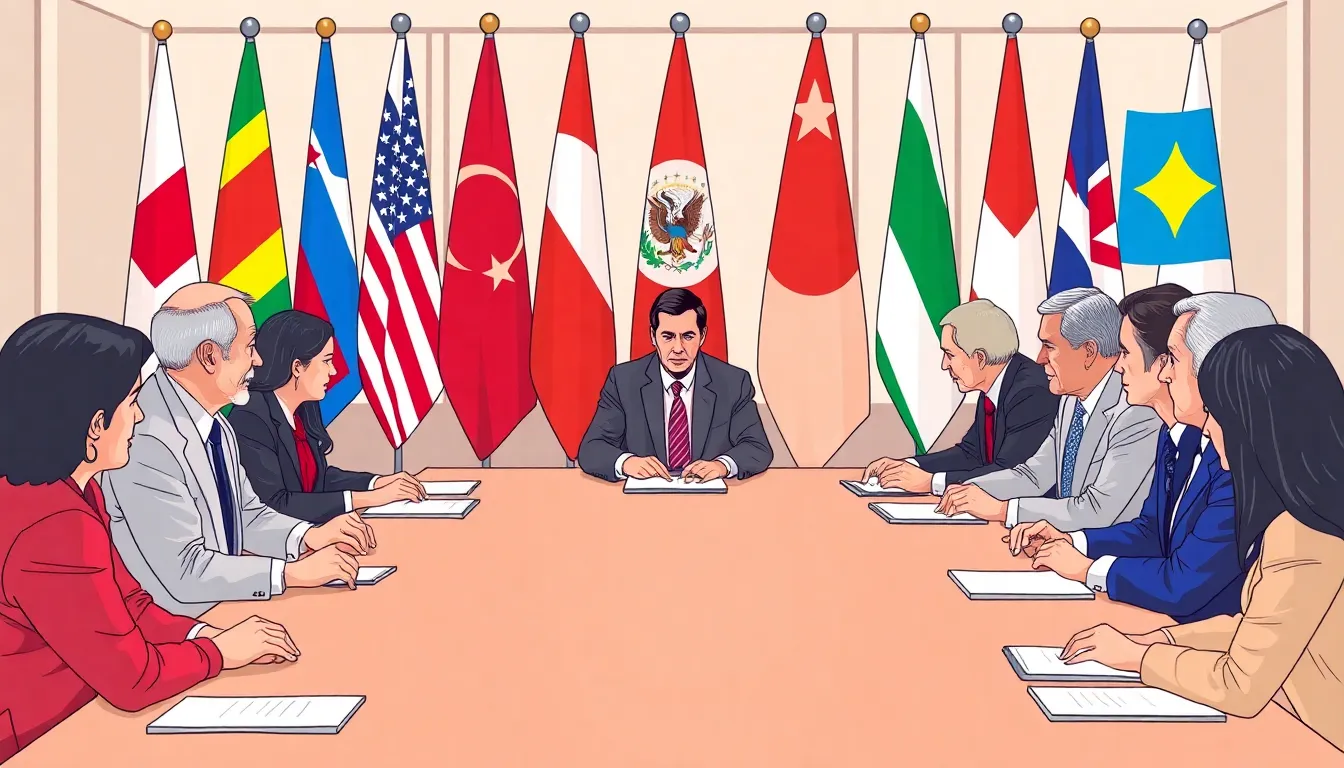Table of Contents
ToggleIn a world where borders blur and everyone seems to be just a click away, global affairs takes center stage. It’s not just a fancy term tossed around in political debates or international conferences; it’s the intricate web of relationships, economic ties, and cultural exchanges that shape our daily lives. From climate change to trade wars, understanding global affairs is like trying to solve a Rubik’s cube—colorful, complex, and oh-so-satisfying once you figure it out.
Imagine navigating a world where decisions made thousands of miles away can impact your morning coffee price or the latest smartphone release. Global affairs captures this dynamic landscape, blending politics, economics, and social issues into a thrilling narrative. So, buckle up and get ready to explore how these global connections influence everything from your local community to the farthest corners of the planet.
What Is Global Affairs?
Global affairs represent the intricate web of international relations that influence societies worldwide. These relationships encompass political interactions, economic agreements, and cultural exchanges, all shaping how nations operate on the global stage. Economically, trade agreements and tariffs can significantly alter local markets, affecting what consumers find available and at what costs.
Culturally, globalization fosters a shared exchange of ideas, traditions, and innovations. Such exchanges enrich communities but can also lead to tensions between local customs and global influences. Politically, decisions made by global organizations, like the United Nations, impact governance and human rights across various nations.
Understanding global affairs requires analyzing how events—regional conflicts, climate change, and technological advancements—interact. They create mass migrations or alter supply chains worldwide. These dynamics demonstrate that actions in one region can ripple, triggering reactions far from their origin.
Researching global issues, such as poverty or environmental challenges, reveals interconnected solutions requiring unified international efforts. For example, climate treaties illustrate how countries work together to combat global warming while balancing national interests. This cooperation illustrates that global affairs depend on collaboration and strategic negotiation.
In essence, global affairs serve as a crucial lens through which people can better understand their role within the larger world. The ongoing dialogue among nations shapes policies, economies, and cultural landscapes, making awareness of global affairs essential for informed citizenship.
Key Components of Global Affairs

Global affairs involve several key components that interact in complex ways. These components include international relations, the global economy, and environmental issues, all of which shape the modern world.
International Relations
International relations focus on the interactions between countries. Diplomacy plays a crucial role in maintaining peaceful ties. Alliances formed between nations, such as NATO, influence security strategies and defense policies. Trade agreements, like the US-Mexico-Canada Agreement, create economic interdependence, which can deter conflict. Additionally, organizations such as the United Nations facilitate cooperation and peacekeeping. Relationships among countries influence everything from humanitarian efforts to the distribution of resources, directly impacting daily life.
Global Economy
The global economy encompasses trade, investment, and financial systems across countries. Economic agreements facilitate the movement of goods and services, affecting prices and availability. Currency fluctuations impact international trade balances and economic stability. For instance, tariffs can alter the cost of imports, shaping local markets. Furthermore, multinational corporations often operate in various countries, driving job creation and innovation. Economic policies adopted by one country can ripple through global markets, illustrating the interconnectedness of economies worldwide.
Environmental Issues
Environmental issues transcend national borders, making global cooperation essential. Climate change represents a significant challenge, prompting international agreements like the Paris Agreement. Efforts to reduce carbon emissions require collaboration among nations to set and meet targets. Biodiversity loss and resource depletion also demand attention, as these issues affect food security and public health. Global initiatives aimed at sustainability, such as the UN’s Sustainable Development Goals, illustrate the collective effort needed to address pressing environmental challenges. Each country’s policies impact others, highlighting the importance of shared responsibility.
Importance of Global Affairs
Global affairs hold significant importance in shaping national and international landscapes. Understanding these affairs is crucial for informed citizenship in today’s interconnected world.
Impact on National Policies
National policies often reflect decisions made on global platforms. Experts analyze international agreements and treaties that directly influence domestic legislation. Trade policies, for instance, can shift when countries negotiate tariffs and quotas, leading to changes in local markets. Environmental regulations may also adapt as nations address global climate initiatives. International cooperation fosters policies that promote stability and economic growth, while crises abroad can trigger urgent responses at home. Consequently, policymakers must remain aware of how global interactions shape the legislative environment.
Role in Conflict Resolution
Conflict resolution heavily relies on the dynamics of global affairs. Diplomatic solutions emerge from open communication among nations. Peace treaties and negotiations often succeed when backed by international organizations like the United Nations. Mediators work to create dialogue and foster compromise, helping to defuse tensions. Furthermore, historical examples illustrate how multilateral efforts can broker lasting peace. Global diplomatic relationships frequently facilitate trust-building, enabling parties to collaborate toward common goals. Ultimately, understanding these mechanisms plays a vital role in promoting stability in an increasingly complex world.
Challenges in Global Affairs
Global affairs face various challenges that demand attention and action. Geopolitical tensions often emerge from historical conflicts, territorial disputes, and power dynamics among nations.
Geopolitical Tensions
Geopolitical tensions arise from conflicting interests among nations. Regional conflicts, such as those in the Middle East, illustrate how historical grievances can lead to ongoing strife. In addition, race for resources often exacerbates these issues, as countries vie for access to energy, minerals, and water. Diplomatic efforts through organizations like the United Nations aim to mitigate these tensions and foster dialogue. Successful negotiations can pave the way toward stability and peace. The role of strong alliances, such as NATO, also proves essential in deterring aggression and fostering cooperative security measures.
Economic Disparities
Economic disparities significantly impact global relationships. Inequities manifest between developing and developed nations, leading to social unrest and migration. Wealth distribution affects trade dynamics, where affluent countries maintain economic advantages that leave poorer nations behind. These circumstances result in imbalanced growth and development, as well as heightened competition for foreign investments. Trade agreements often attempt to level the playing field, but they can also reinforce existing inequalities if not adequately structured. Addressing these disparities through innovative economic policies and fair trade practices remains vital for promoting global stability and prosperity.
Future of Global Affairs
Emerging trends in global affairs shape the future landscape. Technology advances play a pivotal role in redefining international interactions. Countries invest in digital diplomacy, recognizing the importance of online engagement to influence public opinion and policy-making.
International collaboration focuses on urgent issues like climate change and public health. Continuing evidence shows that nations cannot address global challenges in isolation. As climate impacts intensify, treaties like the Paris Agreement become essential for building collective action against environmental threats.
Economic relationships evolve in response to shifting power dynamics. The rise of economies in Asia, particularly China and India, influences trade patterns and investment flows. Countries adapt their policies to accommodate this changing economic reality, fostering new alliances and partnerships.
Geopolitical tensions drive nations to pursue innovative strategies for conflict resolution. Organizations such as the United Nations gain prominence for facilitating dialogue and promoting peace. Diplomatic efforts become crucial in mitigating disputes, as seen in recent negotiations surrounding nuclear disarmament and territorial agreements.
Public opinion shapes policy discussions as citizens become more informed about global affairs. Increased access to information empowers individuals to advocate for international cooperation and sustainable practices. Grassroots movements demonstrate the power of collective action, inspiring leaders to prioritize global solutions.
Understanding the trends in global affairs equips individuals to navigate an interconnected world. Awareness of the evolving dynamics fosters informed citizenship, encouraging active participation in shaping policies that impact both local and global communities. The next generation of leaders holds the responsibility to address these challenges effectively, ensuring a stable future for all.
Understanding global affairs is essential for navigating today’s interconnected world. The intricate web of international relations influences local communities and shapes global dynamics. As individuals become more aware of these connections they can engage more effectively in discussions about policies that impact both their lives and the broader society.
The challenges and opportunities presented by global affairs require informed citizens who can advocate for cooperation and sustainable practices. By recognizing the significance of diplomacy economic agreements and cultural exchanges individuals can contribute to a more stable and prosperous future. The next generation of leaders will play a crucial role in addressing these complex issues ensuring a collective effort toward global solutions.







